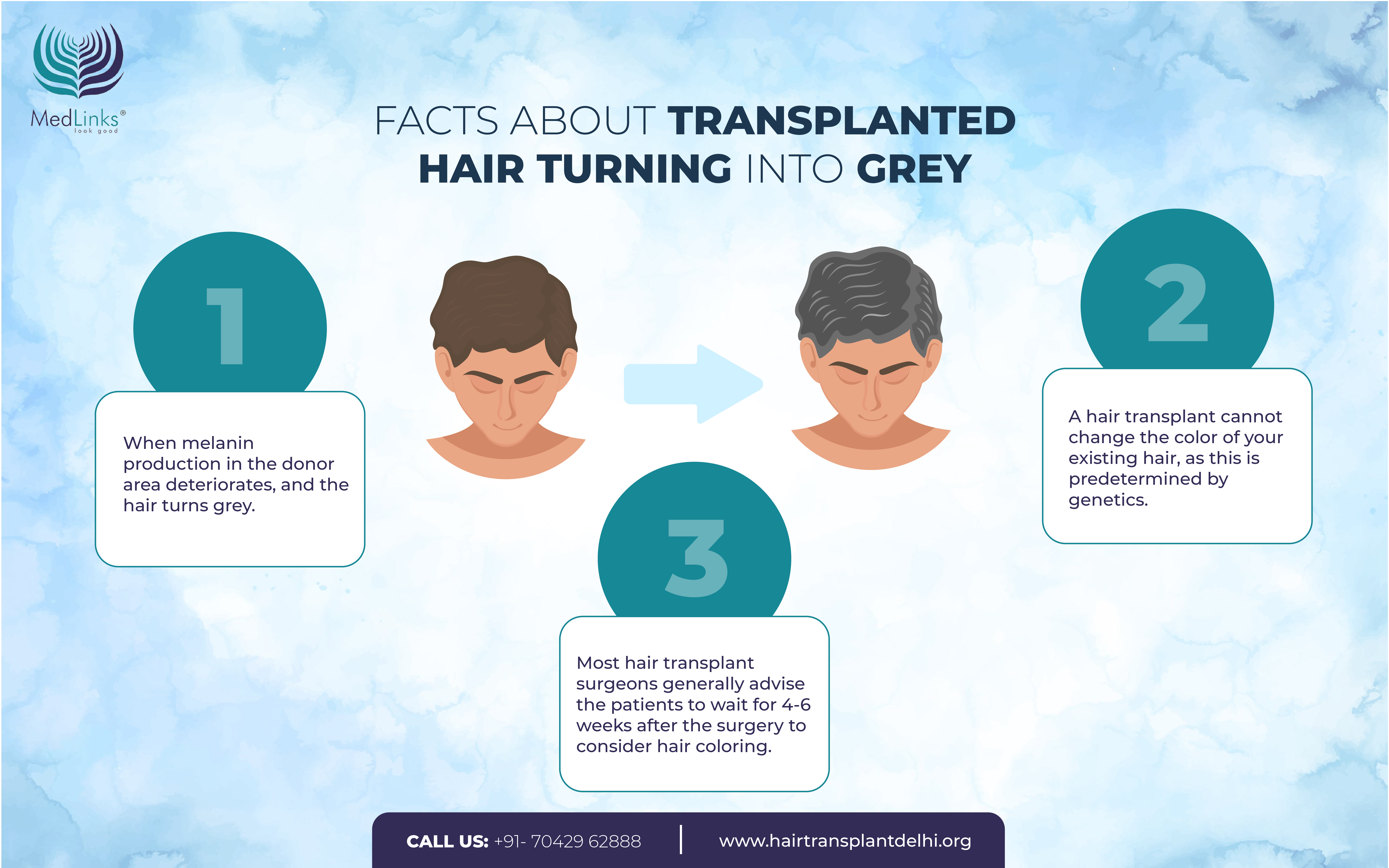- Home
- About Us
- Hair Transplant
- Hair Loss
- Medical Treatment
- Patients Gallery
- Our Patients
- Blog
- Contact Us
- Hair Transplant Cost
- Book an Appointment
- Brochure

When it comes to coloring your hair after a successful hair transplant surgery, the question isn’t about “If you can color it?” It is more about “When can you color it?” Right after a week of the surgery? Definitely not. A few months down the line? Possibly.
Undergoing the best hair transplant in India means that you need to give your transplanted hair the time it needs to grow into a full-fledged tuft of hair on your scalp. Any kind of harsh chemicals from the hair color before that time can impose risks of damage, sometimes even permanent.
Besides the actual surgical procedure, a patient also needs to be mindful of the aftercare instructions that the surgeon advises. So, whether or not you can color your hair after a transplant is a question we will be answering in this guide.
Feel free to skip ahead if one topic catches your eye:
The color of your transplanted hair is going to mimic the appearance of the rest of your hair on the scalp, especially the ones from the donor area.
So, if you are a healthy male who is 25 years old with no appearance of grey hair on your scalp, you aren’t going to witness that in the transplanted site too. However, if your donor area hair were already grey, the chances are that the newly regrown hair in the transplanted site will also be grey.
It all comes down to the quality, characteristics, and color of the hair in your donor area. The transplant or the surgery itself has no contribution to your hair color in the recipient area.
Whether color after a hair transplant is safe or not is a question that your hair transplant surgeon will answer for you in detail.
The thought of getting hair color is often witnessed in patients who witness regrowth of grey hair in the transplanted site. Not only does it dampen the established self-esteem in the patients, but it can also make them question the entire procedure and whether the efforts were even worth the hassle.
So, to answer whether you can color your hair after a transplant, the answer is yes. But, with caution and after discussing everything at length with your consulting surgeon.
Getting long hair color means exposing your scalp to harsh chemicals like bleach and peroxides, all of which can alter the vitality of the transplanted hair follicles if you color them too quickly after the surgery. Premature coloring can also impact the recovery process and result in infections and allergies.
So, most hair transplant surgeons generally advise the patients to wait for 4-6 weeks after the surgery to consider hair coloring.
| Also Read: Is Itching After Hair Transplant Normal? |
As we said, a patient should ideally wait for at least 4-6 weeks after their hair transplant surgery to consider hair coloring. If you want to color your hair before that, you will hamper the recovery process quite drastically.
By six weeks, not only the scalp gets healed and recovered, but even the grafts become permanently embedded into the scalp, so you won’t have to worry about damaging their vitality in the process.
However, recovery is subjective and will depend on the aftercare that the patient is following. Some patients report complete recovery after 2-3 weeks, while some can even take 6-8 weeks. So, your best bet is to be highly patient throughout the process and not jump the guns as you start seeing signs of recovery.
Also, when considering hair coloring after a transplant, make sure you rely on professionals to help you out with that. They will ensure that the process is done safely without imposing further or irreparable damage to the hair follicles and healing scalp.
Bleach itself contains harsh chemicals, so do the hair dyes. Even a simple mistake will damage the transplanted hair follicles, making the entire procedure a complete waste of time and money.
The bleaching agents and the peroxides contain harsh chemicals that the scalp is sensitive to, especially after surgery. More than the actual hair, the transplanted hair is at risk of damage in the initial days if you don’t treat it appropriately. So, follow your surgeon’s instructions and patiently wait till the follicles and scalp have healing optimally.
| Also Read: Hair Transplant: Facts and Myths |

Leading hair transplant surgeons and specialists at Medlinks suggest that you leave your transplanted hair and scalp as it is for the first few weeks after the surgery. Generally, the standard timeframe of complete healing is between 4-6 weeks, so keep harsh chemicals like bleach and peroxides away from the scalp during that period.
Not just hair coloring, even other hair styling habits should refrain for the same time frame. If you don’t let your scalp and the transplanted hair follicles heal, the chances of a successful hair regrowth diminish substantially.
Although the transplanted hair follicles are indeed a lot stronger and viable compared to natural hair, at the same time, they are a lot more sensitive. So, exposing the newly restored hair follicles to the harsh chemicals will only affect the results you expect a few months down the line.
Experts suggest waiting until the hair follicles have attached themselves to the recipient site and formed their blood supply before you consider any harsh procedures like heat-induced styling or dyeing your hair.
The hair transplant surgery cost in India is quite a substantial amount. And, the last thing you want is to end up damaging the transplanted follicles by dyeing it before it has healed completely.
Following are some of the do's and don’ts your surgeon will advise you with after the surgery.
Do's after Hair Transplant
Don’ts after Hair Transplant
Hair coloring after a hair transplant isn’t taboo, but you need to be patient. If you don’t let the scalp and the transplanted follicles heal completely before exposing a harsh chemical dye, the entire surgery will be wasted. Not to mention that you might end up developing risky allergies or infections.
At Medlinks, you will be guided with the best aftercare instructions following the surgery to help you witness a quicker recovery without any roadblocks. If you are looking for the top hair transplant in India, Medlinks is a leading name loved in India by satisfied patients.

Dr. Gaurang Krishna

Copyright © 2025 Medlinks. All Rights Reserved.
Disclaimer:The content published on this website(hairtransplantdelhi.org) is meant to spread awareness and educate the concerned patients regarding baldness and hair transplants as well as the treatment options available for baldness and hair transplant treatment in Delhi India. Any information on the website shall not be regarded as a prescription from a professional dermatologist. We recommend visiting a dermatologist in person for the right diagnosis and the treatment for any hair issues. We do not guarantee specific results as the treatments and the results vary from person to person.